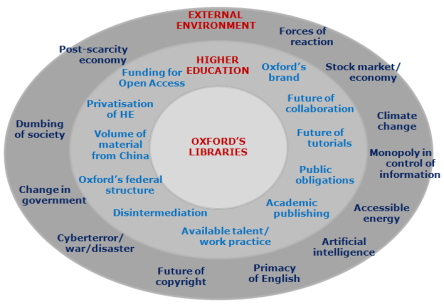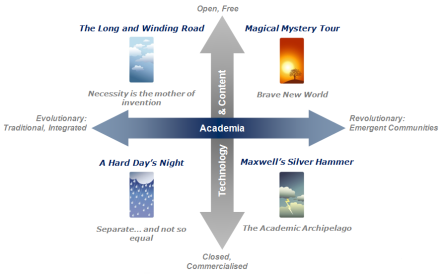Earlier this year, I took part in a scenario planning exercise which brought together a group of librarians from a number of Oxford libraries to consider the challenges that the future would bring and how we could best prepare for them.
Brainstorming factors affecting libraries in the future
We began by considering factors that could have an impact on our libraries in the future, and we came up with nearly 150 ideas. Of this list, these were rated as being the most important and the most uncertain:
“The right – the most robust – responses to these issues will have to take into account a wide variety of uncertainties – dynamics over which Oxford’s libraries have no control.”
Lawrence Wilkinson (facilitator)
These were further distilled to elicit that the two uncertainties that were the most important and the most uncertain – the dimensions in which the alternative futures are most different; and these were:
- academia and the demand it serves – whose extremes are traditional and integrated vs reorganised, emergent communities
- technology and content – whose extremes are closed, restricted and commercialised vs open and free
These two fundamental uncertainties are juxtaposed to create four divergent futures (or scenarios) for Oxford’s libraries.
Four alternative futures
- “The Long and Winding Road” – a world with generally free and open access to information, and a familiar, traditional model of academic life.
- “Magical Mystery Tour” – a world with generally free and open access to information, and academic life taking place in new kinds of communities
- “Maxwell’s Silver Hammer” – a world with generally closed and commercialised access to information, and academic life taking place in new kinds of communities
- “A Hard Day’s Night” – a world with generally closed and commercialised access to information, and a familiar, traditional model of academic life
Examples of early players in each scenario
- “The Long and Winding Road” – arXiv.org, MIT
- “Magical Mystery Tour” – Google, Khan Academy
- “Maxwell’s Silver Hammer” – Kaplan, The Learning Academy
- “A Hard Day’s Night” – Apple, CourseSmart
We then explored each possible future in more detail, and exploring what we would do if we knew this future were the most likely.
From theoretical actions to strategic steps
As the real future is likely to be a combination of the four scenarios, with a balance between them that changes over time, we considered the overall implications for our future. We divided our (very long) lists of actions into strategic steps that would (a) work in all scenarios; and (b) be helpful in one future and neutral in another, and (c) be helpful in one future but harmful in another. These actions covered every aspect of the libraries, including collection/service strategy, funding models, and physical plant (buildings).
The last stage of the process involved only colleagues from the Bodleian Libraries, who met one more time to consider how all of these ideas could contribute to the Bodleian Libraries’ new strategic plan, and translate them into action points for specific teams or departments.
My two cents’
As a college librarian, I was not involved in this last stage, but I was still thinking about how the libraries individually could respond to the challenges and opportunities that had been identified during the course of this work. The main theme I kept returning to was the idea of a collaborative library strategy. This is more difficult than it might first seem, because there are about 100 different academic libraries at the University of Oxford (the Bodleian Libraries group, college libraries, departmental/faculty libraries), and these groups are fully independent of each other (as are most of the individual libraries within each group). Here they are on a map.
As a biologist, I like to think of the libraries as forming an ecosystem with a variety of niches and habitats. However, without an over-arching plan, we may be competing for the same “market” (e.g. level of study; subject; resource type) and risk overlapping in some areas and missing others. I’m wondering if it would be possible to define the niche of each library to help its staff and users to know what to expect from it, and to ensure that as a university, we’re providing as broad a range of resources and services as possible.
This could help avoid conflicting priorities about types of study space, by making different spaces available in different places, but accessible to all users. Some libraries would focus on having lending collections to support taught courses, and others would specialise in research or special collections (thus focusing budgets in particular areas). This already exists to some extent, but it’s not centrally agreed or managed.
I’ve done this at St Hugh’s College Library by introducing a collection management policy that states that we will:
Purchase/accept/retain primarily what can be identified as:
- Useful to an undergraduate/reference library, within the range of subjects taught;
- Interesting in terms of College History, Women’s Education and other research areas specifically connected with St Hugh’s;
- Contributing significantly to areas where the Library already has major strengths;
- Exceptionally rare or valuable.
and that
Duplication should be avoided, unless deemed desirable for study purposes.
This helps to inform my decisions about how to use the budget. For example, most students’ book suggestions submitted via our online form are for books on reading lists, which matches this policy exactly = green light for purchasing. However, if a DPhil candidate wants an unusual item for their research, I would direct them to their faculty/departmental library. As well as focusing my book budget to support taught courses, it also avoids accumulating research materials in a college library which is a private library, rather than at a faculty/departmental library which usually has more generous access arrangements for non-college (not just non-University) members.
Because all of these libraries are independent, there can be no mandate from anyone to any of these libraries to force them to adopt such a strategy, but it may be that some of them opt to do it voluntarily. Perhaps many of these libraries already have similar policies, but perhaps they are not formalised or publicly available.

